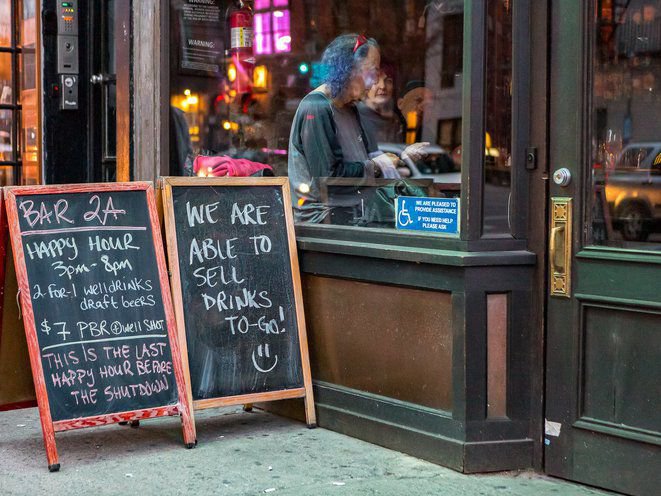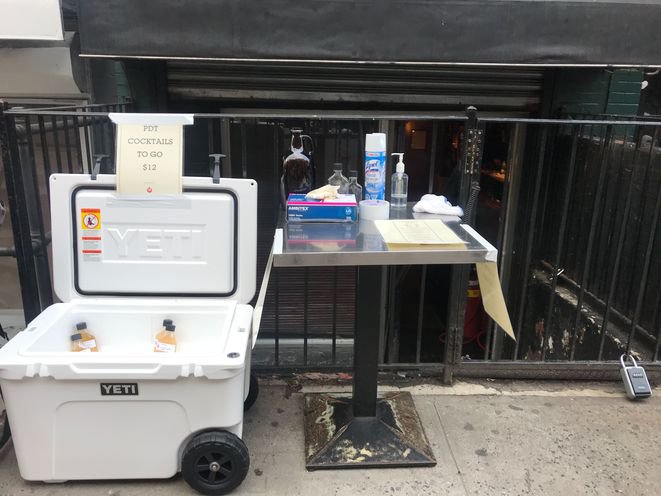What It Would Take To Make To-Go Cocktails A Permanent Reality In NYC
Dec. 23, 2021, 2:53 p.m.
The Mayor supports bringing back the popular cocktails-to-go program, but it's not that easy to bring it back at this point. Here's what needs to happen.

When the city was shutting down and indoor dining and drinking was no longer an option in 2020, a cocktails-to-go program was implemented in New York City under the Temporary Disaster Emergency, established in response to the pandemic in March 2020.
The program—which allowed establishments to sell to-go alcoholic beverages from their storefronts, for delivery, and from third-party delivery services like Seamless—helped some businesses keep their doors open, even when no one was allowed to walk through them.
But on June 24th of this year, the Temporary Disaster Emergency ended, and so did cocktails-to-go. And to bring the program back now — even as the omicron wave washes over the city — is complicated, despite the support of many New Yorkers and politicians, including the mayor.
On Wednesday, Mayor Bill de Blasio told Gothamist, “Cocktails-to-go supported small businesses in a difficult time and made the city more vibrant. It’s still a difficult time, and we still want a more vibrant city. Albany should bring them back.”
And this is a decision for Albany. Governor Kathy Hochul's office declined to comment on the program, but directed us to the State Liquor Authority, who told us this week, “Governor Hochul understands the challenges the pandemic has created for our bars and restaurants and stands ready to partner with these small businesses and with the Legislature in supporting policies that will ensure the full recovery and future growth of this vital industry.”

So when can cocktails-to-go return?
Andrew Rigie, executive director of the NYC Hospitality Alliance, told Gothamist this week that the program should be reinstated immediately.
“Alcohol to go was widely supported and popular with consumers and a lifeline source of revenue for New York City’s restaurants and bars for months during the pandemic," Rigie said. "With a rise in COVID-19 cases, the cancellation of holiday parties, and extreme struggle and uncertainty for restaurants and bars across the five boroughs, it’s critical that the important alcohol to go policy is reinstated now.”
However, since the program can no longer be extended under an executive order, and since, according to the SLA, there is no provision in the Alcoholic Beverage Control law to allow them to temporarily extend restaurants' ability to sell cocktails-to-go, there will need to be a change to the law. And that cannot happen immediately.
This will require both houses of the New York State Legislature to pass a bill. And even though the Assembly and State Senate have introduced bills permitting establishments "to sell for takeout and deliver alcoholic beverages for off-premises consumption," the timeline of pushing them through does not match the urgency of the situation.
The legislative session begins on January 5th, 2022, and the SLA said, "Bills could be passed by the legislature at any point in the legislative session - which typically runs through mid-June," which means it could be up to 6 months before the program returns.
And there are no guarantees it will pass — the push for permanent cocktails-to-go began in May 2020. At that time, legislation was introduced by Manhattan State Senator Brad Hoylman, who sought to keep the program going forever, but it failed to pass the state legislature this summer.
"If we want our favorite bars and restaurants to survive the crisis, we’ve got to help them adapt," Hoylman said at the time. And with omicron shutting down restaurants and bars once again, the sentiment remains.
Assemblymember Patricia Fahy, both a co-sponsor of the bill to make to-go drinks permanent and the sponsor of a bill to extend the program through at least 2022, told Gothamist on Thursday that it could take a while.
"It's a bill that's had a lot of resistance. It sounds like a no-brainer, why not help restaurants, some of the most impacted [businesses throughout the pandemic]?" she said in an interview. "That's the bottom line for me, you gotta keep the doors open."
Fahy added that most of the backlash is from New York City, and also the liquor store industry.
"It is rather surprising, [legislative] members who are pro-cannabis, when it comes to alcohol they are very different. The other major opposition is the liquor store industry. It's unfair, there's tension between the restaurant industry and the liquor store industry," she said. "I'll be honest, [the latter] has a lot more power than I realized. I went into this more optimistic."